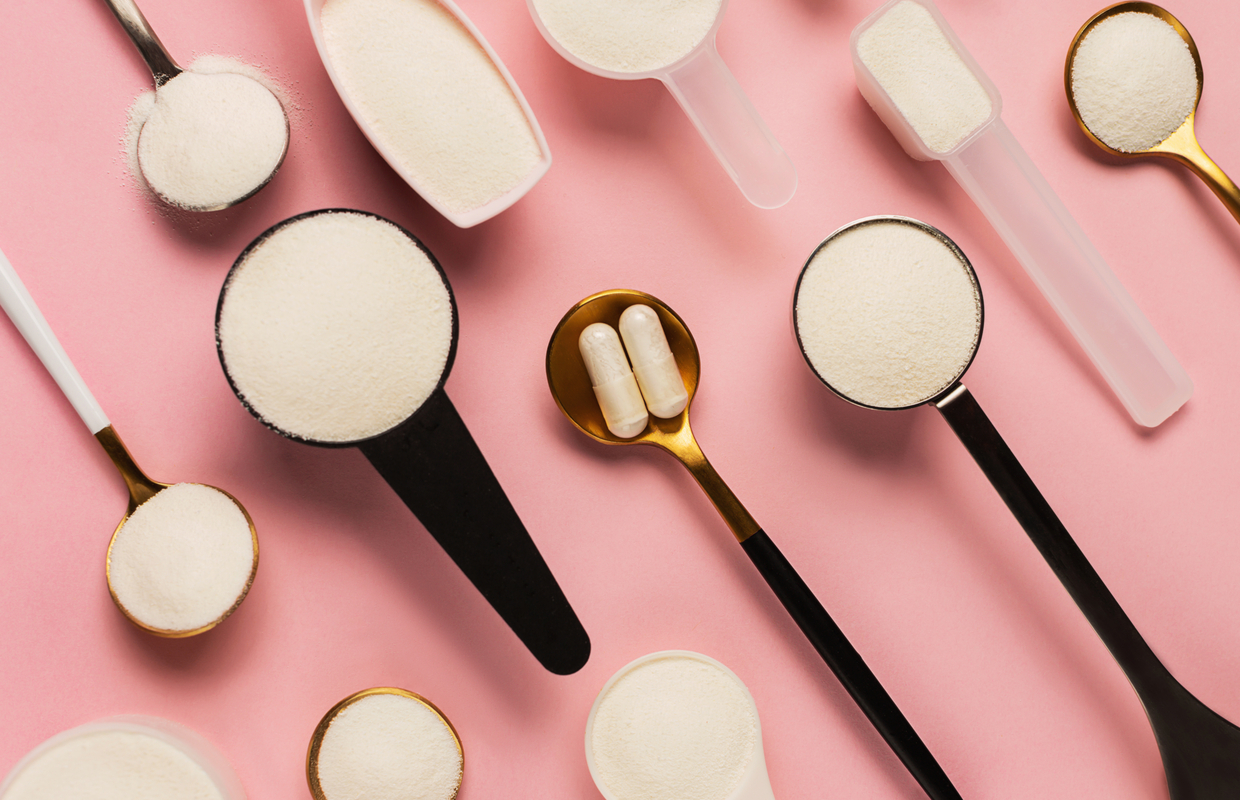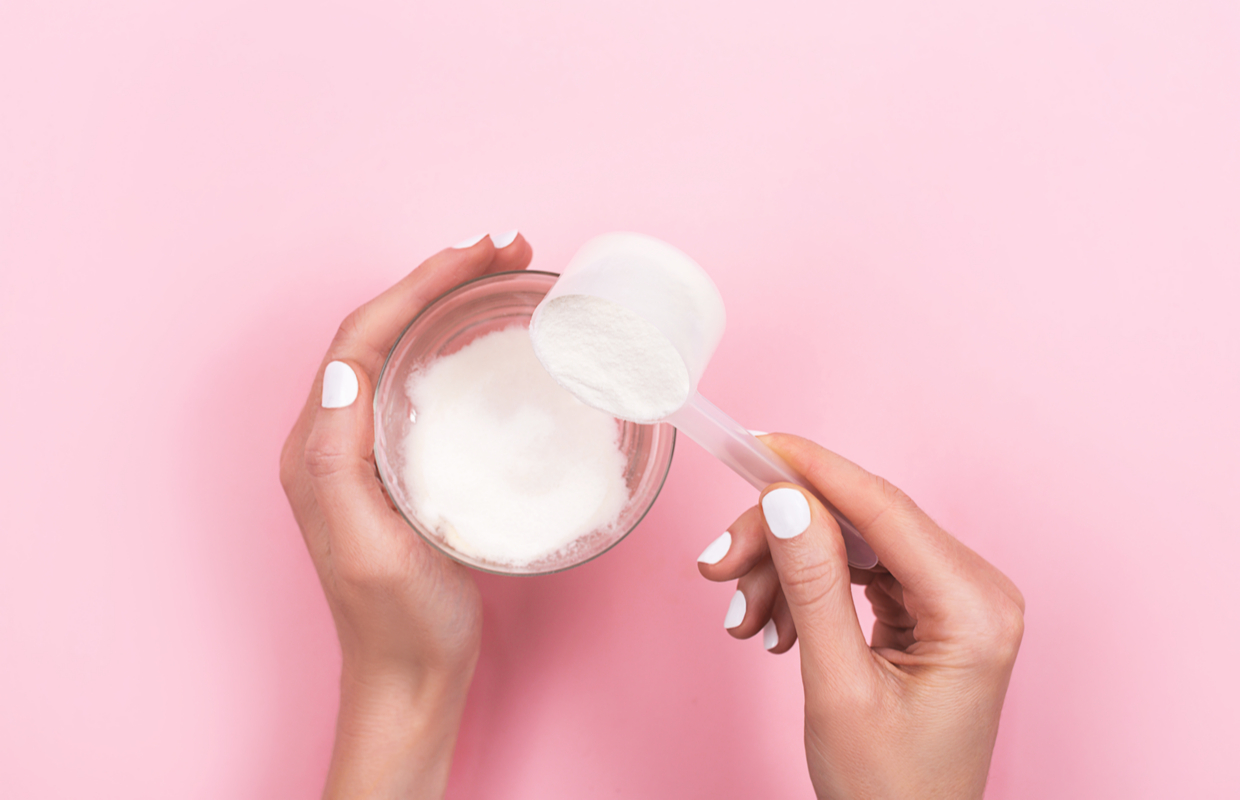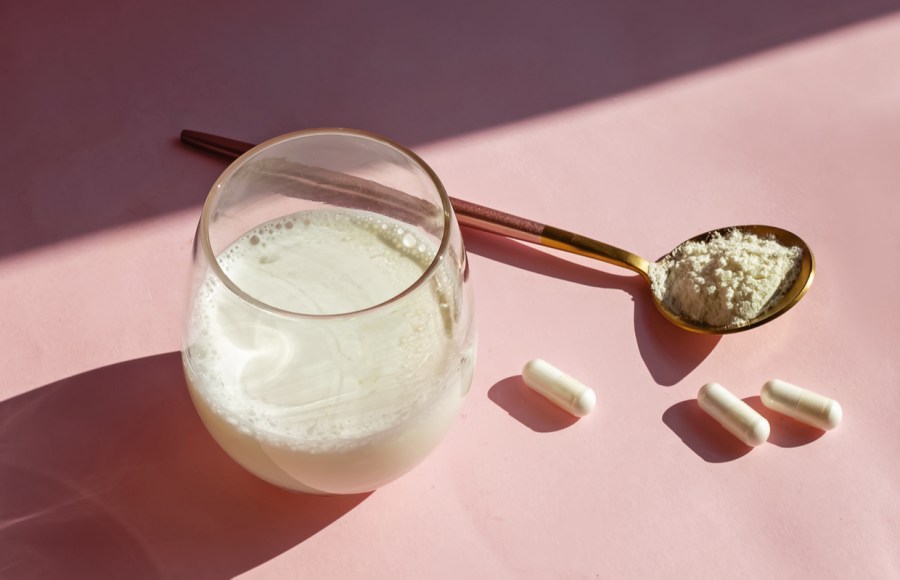Confused by the many types of collagen supplements on the market? Nutritionist and food scientist Susie Debice chats to editorial director Katy Sunnassee to explain how collagen supplements work and to help you find the right product to feel and look great…
Types of collagen
Collagen is made slightly differently depending on where it is in your body. It’s basically long chains of amino acids that are all organised in different sequences depending on where they go. We have identified 28 different types. However, we tend to mainly hear about only five of them, as they’re the ones that most collagen supplements use…
- TYPE 1 tends to be in bones, skin, tendons, ligaments and connective tissues.
- TYPE 2 is in cartilage and in your eyes.
- TYPE 3 is usually present alongside type 1.
- TYPE 4 is part of cell membranes.
- TYPE 5 tends to be in hair and in your skin cell surfaces.
Bovine collagen contains types 1 and 3, while marine tends to just contain type 1.
Which type of collagen supplement is best?
Susie: ‘What a lot of companies are doing to market their collagen supplements is to say they’re using a particular type or types of collagen, i.e. type 1 and 3, or type 5, which means they’ll end up benefiting those associated areas of the body. But that’s marketing hype and not really what’s happening.
‘Although it is based on some science, what actually happens when you ingest collagen is that each molecule has to be completely chopped down to its smallest components. These are either two or three amino acids long, or they could be single-molecule ‘free’ amino acids.
‘We have to absorb these tiny molecules across the intestinal lining and into the bloodstream. They then go to different areas of the body where special cells called fibroblasts, which are in your cartilage and skin, rebuild them.
‘These, in turn, knit together into long chains of polypeptides. These can be scrunched up into triple helix molecules and then integrated into the body part where they’ve ended up. So it’s quite a complex process and relies on good digestion!’

How do collagen supplements work?
Susie: ‘Essentially, the body breaks down the collagen in the supplements, whatever type you’ve had, then puts it back together in a form it can use. There is also there’s a special amino acid in bovine and marine collagen called hydroxyproline.
‘The bonds between hydroxyproline and proline, or hydroxyproline and glycine are super strong, like super glue – it’s virtually impossible for stomach acid or any strong peptide enzymes to break them down. Hydroxyproline acts as a signpost your body recognises and actively shuttles it towards those areas where it needs collagen, particularly in the skin. Bovine and marine collagens are rich in hydroxyproline.’
What parts of the animal does the collagen for supplements come from?
Susie: ‘We source collagen from wherever we find gelatine in the animal, as we create collagen from gelatine, or with fish (marine collagen) it’s from the skin or the scales.
The research I’ve seen shows that there isn’t a difference whether it’s marine or bovine because our body is going to chop it all down into di, tri or single peptides. Our body will have to absorb and then reassemble all of this into something it can use. What is important, though, is a person’s digestion. The better it is, the better we can break down and absorb the collagen.’
What is hydrolysed collagen?
Susie: ‘Hydrolysed collagen peptides are smaller than regular collagen A peptide – a single amino acid – is anything between 75 daltons to about 250 daltons molecular weight. Raw, unprocessed collagen is around 50,000 daltons in size, and gelatin is 10,000 daltons.
‘However, your body can only absorb 450 daltons in molecular size. So, it has to break down those huge molecules into small ones. Hydrolysed collagen is so much easier to process and absorb because during the hydrolisation process, our body splits all the triple helixes to leave single strands, which it further chops up into little sections.
‘We usually find hydrolysed collagen in good-quality supplements with around 5-3,000 daltons. With some we’re now seeing 2,000 daltons, which is even better, as all the body’s got to do is get those 2,000 units down to around 450 daltons or lower, so that’s a single amnio acid or a double or triple peptide. The lower the number the better, as your body has less work to do chopping up the molecules.
‘It’s worth looking on a collagen supplement company’s website to find out the daltons as, if the packaging doesn’t say how big the molecules are, you won’t know how much work your digestion has got to do.’
What’s the difference between hydrolysed collagen and collagen peptides?
Susie: ‘Collagen peptides could be peptides of any length – they could be collagen polypeptides with multiple molecules. Collagen peptides are where the triple molecule helix has been undone. They might have been chopped in half or maybe four ways to make them a bit smaller. But they are not that small; not as small as with hydrolysed collagen.’

Are ‘collagen protein powders’ effective?
Susie: ‘If something only contains, say, 30 per cent collagen per scoop because it also contains other protein powders, such as pea or rice, you’re getting a third of the collagen that you would get if you had a pure collagen peptide supplement. They’re not bad, but they are unlikely to be as effective in terms of collagen support.’
Should you take collagen supplements on their own or with a meal?
Susie: ‘You can have it on its own in water, or in a smoothie, as long as you’re not having it with a main meal, especially one containing protein. This is because you want your protein enzymes to be working on breaking down the collagen, not the steak or roast chicken you’re eating. But having some collagen before a workout in a smoothie is OK.’
How is vitamin C linked to collagen formation?
Susie: ‘Your body can’t achieve much with collagen unless it’s got enough vitamin C to go with it. There are two enzymes in the fibroblasts – those special collagen-knitting cells – that work hard to join all those amino acids back together. These are dependent on vitamin C. It’s all about optimising that rate of conversion. So, taking vitamin C at the same time as your collagen is really important.’
Can taking collagen supplements improve gut health?
Susie: ‘If your intestinal lining becomes inflamed due to stress, poor diet or imbalanced gut microbiome then tiny holes appear (leaky gut). Undigested food particles and pathogens gain access into the body burdening the immune system and liver.
‘Collagen provides strength and integrity to the intestinal lining, so replenishing collagen is important. There’s also a huge connection between the gut and skin. This is especially true if you’re an acne sufferer or you have problematic skin.’
Related: 5 ways to rebuild collagen and tighten sagging skin
Words: Katy Sunnassee & Susie Debice







